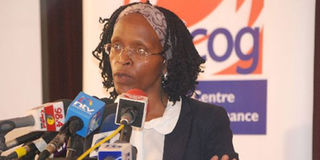Africog launches website on electoral malpractices

Africog's Execurive Director Ms Gladwell Otieno addressing the press on April 12, 2013 at the launch of the firm's website that will be used to upload evidence on electoral malpractices. Photo/DENISH OCHIENG
A website with evidence detailing electoral malpractices of the March 4 General Election which the Supreme Court ruled against during the petitions has been launched.
Ms Gladwell Otieno and Zahid Rajad from Africa Centre for Open Governance (Africog) have partnered with Inform Action Director Mr Maina Kiai to launch the 'People's Court' (www.peoplescourt.co.ke) where evidence on electoral malpractices will be uploaded.
The public would also have a forum to post their experiences during the elections.
The public would also be allowed to criticise and recommend new ways of conducting a free and fair election which the Independent Electoral and Boundaries Commission (IEBC) can adopt.
“This is not about individuals but the elections process. The website will open a public debate with the aim of strengthening our democracy,” said Africog's Executive Director, Ms Otieno.
The website has been launched ahead of a detailed finding to be released by the Supreme Court on its ruling during that upheld the election of Uhuru Kenyatta as Kenya's fourth president.
The Supreme Court ruled that the election was free, fair and transparent.
The court dismissed petitions by Africog and Cord's presidential candidate Raila Odinga challenging the validity of the elections and the victory of Uhuru Kenyatta.
Africog said it would upload a 900 page document detailing evidence on alleged electoral malpractices it managed to gather in its monitoring of the electoral process for the people to decide.
“Supreme Courts could be wrong and they have been wrong in the other jurisdictions such as in the US. That is why we want an open debate on this issue to allow the public to decide for themselves what took place,” said Mr Kiai.
Ms Otieno said the intention of kick-starting the debate was not to change the decision by the Supreme Court but to initiate debate among Kenyans about their institutions.




